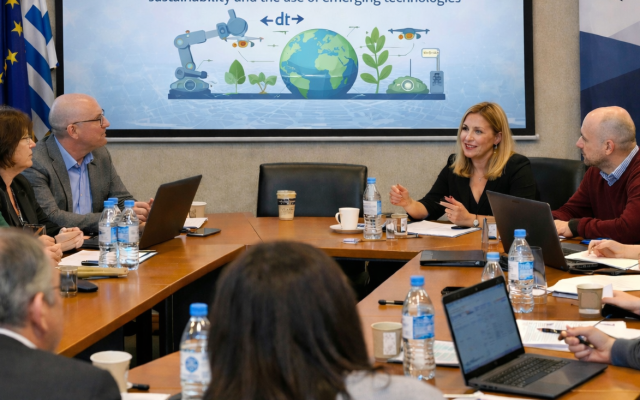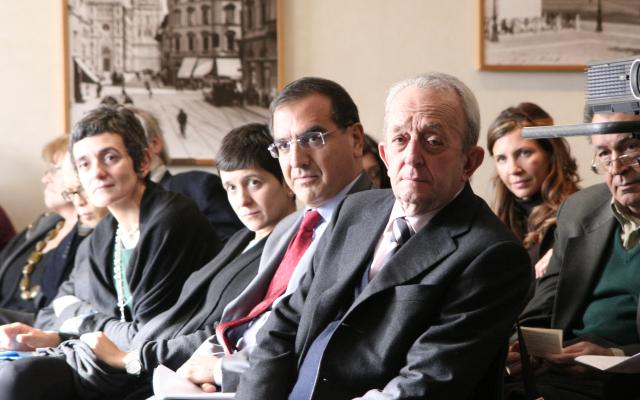Brian Holmes (EACEA): “The project developed by the Federico II University is a reference point for the future of education and its assessment in school and in the working world.”
On Thursday, December 3, Project Enact developed by the NAC Laboratory at the Naples “Federico II” University received an award for European Excellence in terms of new technological tools developed for education through EU Projects at “OEB – Online Educa Berlin,” the most important international conference on the future of learning tools.
“It’s a reference point for European Research on new technologies for learning and the evaluation of soft skills,” explained Brian Holmes, Director of the Education, Audiovisual and Culture Executive Agency (Eacea), describing Project Enact during the awards ceremony at the “Oeb – Online Educa Berlin, the most important international conference on the future of learning tools (December 2-4, 2015).
Based on an artificial intelligence system, innovative psychological methodologies and virtual environments, ENACT aims to improve the communication and negotiation skills of individuals through the use of an avatar that interacts with the user. In particular, the avatar provides users with 5 possible answers that are elaborated by the system to determine the user negotiation style.
“The creation of tools that can formally evaluate soft skills, our ability to interact, resolve conflicts, work in teams and make decisions,” explains EACEA Director Brian Holmes, “is a priority, not only for schooling, but also for the working world. Europe is investing a lot in this sector, especially to allow small enterprises to access efficient and sustainable personnel selection tools.”
Financed by the European Union as part of the “LLP - KA3 Multilateral Projects” Programme, Project ENACT - Enhancing Negotiation skills through on-line Assessment of Competencies and interactive mobile Training is a milestone in training and psychological evaluation: psychological modelling methodologies, use of innovative technologies (e-learning, mobile app, Internet, artificial intelligence), and AI systems.
Project ENACT is coordinated by the University of Plymouth; partners include: "Federico II” University of Naples, Aidvanced srl (an innovative start-up specialized in robotics and AI), Fondazione Mondo Digitale, Turkish Ministry of Sports and Fundetec Foundation Madrid.
“The EACEA Award,” explains Davide Marocco, poject coordinator and Professor of Psychometrics at the Federico II University of Naples, “is an important confirmation of the importance of identifying new methods to measure and practice our skills. Further proof of this is given by the direct interest of visitors and stakeholders. Indeed, we had many offers to purchase the platform, which is currently freely accessible on-line. In any case, these requests prove that research can effectively provide answers to market needs.”
Not only Enact. NAC also presented other research products at OEB, including Block Magic, Stelt and Emogic.
Block Magic. This is a 2.0 version of the old logic blocks adopted by generations of teachers. In continuity with the old Montessori blocks, the shapes and the interactive Block Magic tablet aim to expedite the development of manual skills amongst young children, as well as their manipulation abilities and pro-activity. Block Magic, which is based on digitally controlled blocks, exploits RFID and NFC antennae through which the software proposes exercises, stimulates and develops creative, mathematical, logical, strategic and social activities. In particular, while the child is working on the exercises, Block Magic provides both acoustic and visual feedback to help the children with the activities.
Stelt is a game creation platform that employs tangible materials such as paper, didactic materials, objects of daily use and elements of artificial intelligence. The platform allows users to create specific learning environments as required by the system editor. STELT adds technological features to physical objects through natural interfaces.
Emogic is a prototype for testing and training cognitive abilities such as abstract reasoning through an innovative approach based on manipulation. The system is founded on classical paper and pencil tests with artificial tutors that can assess answers and produce appropriate feedback based on interaction with the user.



